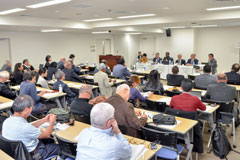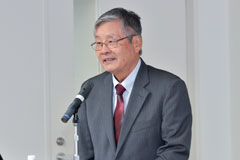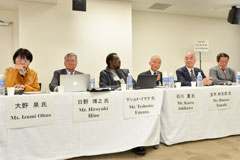How to Foster Social Cohesion in Africa’s Multiethnic Society: Book Launch Seminar Held for ‘From Divided Pasts to Cohesive Futures: Reflections on Africa’
2019.11.28
Together with the Research Institute for Economics and Business Administration at Kobe University, JICA Research Institute (JICA-RI) jointly organized a book launch seminar at the JICA Ichigaya Building on Nov. 12, 2019 for the book “From Divided Pasts to Cohesive Futures: Reflections on Africa.”

The seminar shed light on Africa’s ethnic diversity and social cohesion
In the joint study titled “Ethnic Diversity and Economic Instability in Africa,” JICA-RI and Kobe University have comprehensively examined the correlation between ethnic diversity and poor economic growth in Africa from interdisciplinary perspectives including economics, politics, anthropology and history. The third book to be published from this research was released by Cambridge University Press in Aug. 2019. Edited by Duke University Visiting Research Scholar Hiroyuki Hino (previously a professor at Kobe University and visiting professor at the University of Cape Town), Katholieke Universiteit Leuven Professor Arnim Langer, Cambridge University Professor Emeritus John Lonsdale, and Oxford University Professor Emeritus Frances Stewart, the book reflects on social cohesion in Africa’s multiethnic society and presents the future prospects for social cohesion in Africa. The book consists of 13 papers written collaboratively by more than 20 historians, economists, and political scientists at research bases in Africa, Japan, Europe, and North America.
JICA Senior Vice President Nobuko Kayashima, who gave the opening remarks at the seminar said that with many countries and regions confronting the problem of social division due to differences in ethnicities, religions, and other such factors, it is not easy to increase social cohesion while also achieving economic development. She expressed hope that an active discussion will take place about these possibilities and challenges, as well as what the roles of international society including TICAD should be.
Hino, who led the research, started the event with a keynote speech. He touched on how feelings of inequality between and within ethnicities in many regions of Africa are making people more exclusionist, breaking down mutual trust and eroding social cohesion. He said that social cohesion is comprised of three elements: inequality, the identities of individuals, and trust in other people and communities. Recognizing that Africa’s strength is in its diversity, he said that for the economic and social development of African countries, it is most important to take a bottom-up approach based on social cohesion. He closed his speech by saying that Africa’s past experiences from confronting ethnic division, learning from it, and working to foster social cohesion over the years may prove useful in protecting social cohesion in western nations which are experiencing greater ethnic divisions in recent years.

Duke University Visiting Research Scholar Hiroyuki Hino
In the panel discussion that followed, experts on development in Africa shared their opinions while JICA-RI Director Izumi Ohno served as moderator.
When Ohno asked, “Do you agree this challenge is not unique only to Africa?” Kaoru Ishikawa, specially appointed professor at Kawamura Gakuen Women’s University (former ambassador of Japan to Canada and to Egypt and director-general of the Economic Affairs Bureau of Japan’s Ministry of Foreign Affairs) said he believed that deep ethnic divisions in society are not limited only to Africa. He pointed to historical perspectives, citing the examples of Belgium which is divided by the languages people use, and Canada which aims to be a mosaic country that preserves ethnic cultures and identities. He said that when we look at Africa, we realize that we can learn from it as we reflect on the histories of our own countries.
Rintaro Tamaki, president of the Japan Center for International Finance, described the changing mentalities of international institutions based on his experiences including three stints in Paris as deputy secretary-general of the OECD. He said the OECD conventionally believed it was enough to just communicate policy recommendations discussed in Paris to developing countries, but global financial crises have led to an awareness that the challenges are shared by both developing and developed countries.
Teshome Emana, associate professor at Addis Ababa University and visiting professor at Tokyo University of Foreign Studies, called for a change in mentalities and expressed his hopes. He said that people think Africa is rife with ethnic conflict, but the current situation is quite different, citing Eastern Africa’s philosophy of “Ubuntu” which advocates the essential human virtues of compassion and humanity. He claimed that Africans should be able to learn from each other and foster social cohesion if this philosophy can be spread throughout Africa.

Experts on development in Africa shared their opinions
Motoki Takahashi, professor at the Graduate School of Asian and African Area Studies of Kyoto University, said there are regions where conflicts continue, but this is often due to uneven distribution of natural resources rather than inter-ethnic problems. Expressing a positive outlook, he said Africa already possesses a wealth of knowledge on coexistence with many different ethnicities living together, and the hope of modern Africa is evidenced by the strengthened awareness among the people that uneven distribution of resources is a problem that nations have a duty to address.
Ohno then summed up these arguments, saying that we started discussing Africa’s challenges, but we then agreed that they are common challenges for all of us too. She closed her remarks by emphasizing that we learned that tangible good practices are already in place in Africa and that African countries and advanced countries can mutually learn from each other. She also expressed her hope that Japan will keep working with African partners through the TICAD process.
Nobuaki Hamaguchi, director of the Research Institute for Economics and Business Administration at Kobe University concluded the seminar with closing remarks and mentioned the two books that had previously been published based on a decade of joint research with JICA-RI. He said he is pleased that this research has shined light on the complicated relationships between ethnic diversity and economic development, and expressed his hope that the seminar served as a venue to encourage deeper discussion on the matter.

事業事前評価表(地球規模課題対応国際科学技術協力(SATREPS)).国際協力機構 地球環境部 . 防災第一チーム. 1.案件名.国 名: フィリピン共和国.

事業事前評価表(地球規模課題対応国際科学技術協力(SATREPS)).国際協力機構 地球環境部 . 防災第一チーム. 1.案件名.国 名: フィリピン共和国.

事業事前評価表(地球規模課題対応国際科学技術協力(SATREPS)).国際協力機構 地球環境部 . 防災第一チーム. 1.案件名.国 名: フィリピン共和国.

事業事前評価表(地球規模課題対応国際科学技術協力(SATREPS)).国際協力機構 地球環境部 . 防災第一チーム. 1.案件名.国 名: フィリピン共和国.

事業事前評価表(地球規模課題対応国際科学技術協力(SATREPS)).国際協力機構 地球環境部 . 防災第一チーム. 1.案件名.国 名: フィリピン共和国.
scroll